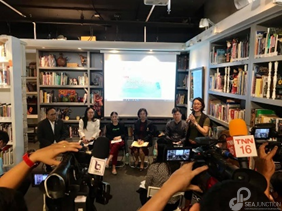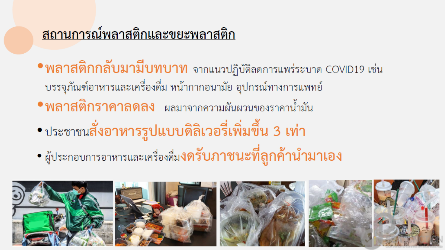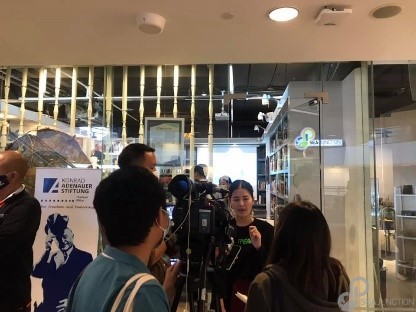Executive summary of panel discussion by Tipakson Manpati (Saiaew)
Thailand was ranked as the sixth largest contributor of plastic waste into the ocean in 2015. The country saw an improvement in 2019 when its ranking became the tenth among the 20 world’s largest marine plastic waste contributors. Starting in January 2020, the Thai government launched a campaign on banning single use plastic at major stores. However, this is not mandated by law and thus dependent on the good-will and cooperation of the private sector.
Out of concern that the use of plastic has worsened due to the impact of the COVID-19 pandemic with the increasing use of plastic containers for food as well as for protection, a public discussion was held at SEA Junction on 26 August 2020 on the “Surge in Plastic during COVID-19 and a Roadmap towards Sustainable Plastic Waste Management”. This was the 5th Dialogue Forum, a monthly forum by Bangkok Tribune in collaboration with SEA Junction, GreenNews, Project Sevana South-East Asia with the support of the Konrad Adenauer Stiftung to “bridge the gap” and “connect the dots” of different views and opinions as well as bits of information on social and environmental issues in Thailand and the larger Greater Mekong Sub-region. Due to COVID-19 preventive measure only about 25 participants, mostly from the media, were allowed on the premises while more watched the online broadcast.

Ms. Piyaporn Wongruang from Bangkok Tribune introduced the “Dialogue Forum” project. (Credit: Lattapol Jirapathomsakul)
Konrad Adenauer Stiftung Thailand’s Director, Dr. Céline-Agathe Caro, mentioned in her opening remarks that plastic is crucial to the protection of the environment and sustainable waste management. Plastic waste also relates to other issues from the rule of law and local participation to social economy and climate change. The media can help raise awareness by, as the series aims, connecting the dots to provide the big picture, thus helping to find innovative and constructive solutions.
The discussion began with Dr. Wijarn Simachaya, President of Thailand Environment Institute, formerly Permanent Secretary of the Ministry of Natural Resources and Environment. He informed the public that each year Thailand produces 28 million ton of waste or 1 kilogram per person. Recently this has increased to 1.5 kilogram per person. For the plastic waste, Thailand produces about 2 million ton per year of which 25% or 500,000 ton are reused. Another 1.5 million ton ends up in the landfill and the remaining is left away without proper management.
“It was forecasted that delivery services would grow 10%. During COVID-19 the delivery services surged to 300% and more plastic came with food delivery such as stall and cutlery sets. The use of plastic during COVID-19 significantly increased and not much can be recycled, so most of them accumulated in the environment.”

The slide provides plastic waste during Covid-19 which includes food containers and drink, face mask and medical equipment. (Credit: Thailand Environmental Institute)
The second speaker, Ms. Wanich Sawayo, Director of Waste Minimization Subdivision, the Pollution Control Department, talked more broadly about plastic waste being a global problem affecting the environment and marine animals. She shared Thailand’s roadmap for plastic waste management, which aims to reduce single use plastic into reuse and recycle within 2030 by applying the circular economy concept to tackle the problem.
The circular economy is a business model that starts with the idea of environmental awareness design of the product that will benefit producer, society and the environment. It generally involves: eco-design; repair and maintenance; return and disassembly; recycle materials and green manufacturing. The achieve this goal, all sector must get involved from the eco-design to segregate, reuse and recycle the plastic waste. Otherwise, it goes to the landfill or flows into the ocean.
According to the speaker, there is currently a Draft of Action Plan on Plastic Management (2020-2023) that already passed the Board of Committee of the Office of the National Economic and Social Development Council. When the review process by the Department of Pollution Control under the Ministry of Natural Resources and Environment is complete, it will be submitted to the cabinet for approval process. After the law is passed, relevant agencies can proceed accordingly.
Since the Ministry of Natural Resources and Environment launched the ban of plastic program at the beginning of January 2020, the Department of Pollution Control has been monitoring this issue closely. As a result of the program, most of the major stores have taken a positive action and cooperate on the ban of plastic bags, but there are still some stores that give away plastic bags. As Wanich stated: “In the future, we will push for the law enforcement to control and manage the single use of plastic. In addition, Thailand is not the world’s dumping site. Thus, the policy must ban import of plastic waste”. She also highlighted another positive development, namely the Food and Drug Administration’s announced ban of microbead plastic in cosmetic products. Admittedly, OXO additive chemical into plastic is problematic and it is misleading to present as OXO-degradable or OXO-biodegradable plastic. In reality, OXO additive in plastic will breakdown the plastic into microplastic that harms the environment.
To address the increase of plastic during the COVID-19 pandemic, the Department of Pollution Control has implemented a project called “turn plastic into merit”. The aim is to encourage consumers who have plastic from delivery services to litter it at recycle bins located at 300 location points.
The third speaker, Dr. Sujitra Vassanadumrongdee, Manager of Chula Zero Waste and Senior Researcher, The Environmental Research Institute, Chulalongkorn University argued that working at the community level to reduce waste was important, but not sufficient if the government doesn’t take action. “If the society perceived [plastic waste] crisis, it is time we need to come together and design the law that will become a social norm that makes plastic everyone’s responsibility,” said Dr. Sujitra.
She added that we need to emphasize on Extended Producer Responsibility (EPR or a strategy to make the producer responsible for the entire life of the product and to calculate environmental costs into the final market value) and circular economy although it is difficult to do so. The production process must have this concept of eco-design and be supported by the government sector as well as by the consumers who reduce the use of plastic and separate the waste.
“All kind of waste is problematic not only plastic. We do need a law about waste management. Passing the law will take a long time, but what we can start to do is reducing the waste and then recycle it,” said Dr. Sujitra.
Dr. Petch Manopawitr, Co-Founder ReReef. former Deputy Director, IUCN Southeast Asia Group, who moderated the discussion pointed out that EPR is key for the law [on plastic management] that will abide producer to be more responsible for their packaging products. For example, Chulalongkorn University charges 2 baht for each plastic bag as economic instrument. So, the money from charging [plastic products] can be used for other activities like charity and so forth.
The fourth and last speaker, Pichmol Rugrod, Plastic Project Leader, Greenpeace Thailand restated that “plastic is the culprit,” and that “we need to urgently tackle this problem”. Greenpeace Thailand conducted a survey on plastic waste in touristic sites around Doi Suthep mountain in Chiang Mai and along the beaches. They found that there were a lot of packaging wastes from many different brands, reflecting the “throw away” culture in Thailand. All those packaging wastes can cause toxic and contaminate the environment affecting ecology, people, and animals.
“We want the producer to be pro-active in reducing the single use of plastic. Our call is to have the policy that requires reuse and refill. The producer must have a plan in accordance to the government’s roadmap to tackle unnecessary plastic or the plastic that cannot be recycled into recyclable or can be reused and incentivize consumer to refill.”
Pichmol continued that the producer must rethink their plastic packaging process. They must think beyond the shelf about where their products will end up and make an effort to protect the environment. The producer’s responsibility lasts for the entire life cycle of the products. Another important strategy is to ensure producers’ transparency. They can be monitored while consumers can access all information related to the packaging products.

Pichmol Rugrod of Greenpeace Thailand was interviewed by media in front of SEA Junction. (Credit: Lattapol Jirapathomsakul)
After the panel the Q & A session was opened. The first question was directed to the Department of Pollution Control regarding the keys components of the Plastic Waste Management Law. Ms. Wanich responded that the Department have been considering different options whether or not the law should focus on plastic waste management or in general on packaging products management. This because packaging products such as glass, paper and plastic need management with EPR and according to the 3 Rs principle as well to realize a circular economy, which will be a key objective of the law. In drafting the law, relevant government agencies and producers will be engaged to express their opinions in this regard.
Following from the first question was whether the current Roadmap is on the right direction and if it follows international standards. Dr. Sujitra responded that the Roadmap is on the right track and what it remains is for it to be sanctioned by law. “We have been talking a lot about the plastic waste management for many years already,” said Dr. Sujitra. “All sectors including relevant government agencies must take up this issue. It is also important to have the law, so that private sector and consumers are mandatory to follow. In the meantime, I think that if the private sector is ready to manage the plastic waste voluntarily – just go ahead while we work on the draft law to be enforced in the case that a voluntary approach doesn’t work,” she added.
Furthermore, another important issue needed to address when talking about plastic waste management in private sector is CSR (Corporate Social Responsibility) and EPR (Extended Producer Responsibility).
“CSR is for promoting a good image of the corporate, but EPR is binding by law, meaning that it is legally mandate that the corporate must do. EPR is to legally compel the whole private sector to work together, thus there will be shared-cost and distribute capital cost. The costs will not concentrate on any single corporate. Thus, producer don’t have to be afraid of paying more money. Because consumer will also have to pay for the cost of packaging products,” said Dr. Sujitra
The final question pointed out on deposit glass bottles (to be returned and reused) which is a good practice, but they are heavier than plastic bottles. In this case, the glass bottles take more cost in terms of transportation and fuel usage. What would be the better choice between glass bottles and plastic bottles?
Dr. Sujitra, took up the question saying that to measure what would be the best choice, there is an assessment instrument called Life Cycle Assessment (LCA). When comparing refill and reuse on what is better for the environment, we need to understand that there are many facets of environmental issue. The plastic seems better when talking about carbon footprint because as said above is lighter and thus requires less energy. However, when we talk about littering, plastic has more environmental impacts. All in all, no matter what type of packing product it is, reusing it as much as possible is better than single use.
In conclusion, all sectors need to cooperate in sustainable plastic waste management. Now that Thailand has the roadmap to tackle the plastic waste problem there needs to be more pressure to pass the law enforcement. Besides banning single use of plastic, we all need to learn practicing 3 Rs as we cannot just wait for the law to materialize first before taking action.
There is further a need to better prepare for managing plastic waste in these COVID-19 times. As a slide of Dr. Wijarn indicated, there are various forms of plastic used for COVID-19 prevention like gloves, surgical masks, protection dresses etc. It should also be noted that the rise of plastic use is facilitated by the decrease in the cost of plastic due to the unstable cost of petroleum. As food delivery outlets are still continuing to use plastic despite the COVID-19 cases have been curbed, it is critical to give more attention to this issue and proactively think about how to stop the ongoing increase in plastic waste. Otherwise, Thailand’s environmental situation will worsen.
See further: Facebook Live; NewsNBT THAILAND; Channel 7 and; Thailand Environment Institute
*Tipakson Manpati (Saiaew)
Tipakson Manpati is Administration & Logistic Officer at SEA Junction since 2018. She has a bachelor’s degree in Mass Communication specializing in newspaper from Chiang Mai University, and a master’s degree in International Development Studies from Chulalongkorn University. She is from a Phutai ethnic community in Kalasin Province, Northeast Thailand and speaks Thai, Phutai, Lao and English. Previously, she was a member of ASEAN Youth – ad hoc group of young people from Southeast Asian countries monitoring the ASEAN policies impacting the youths. She is interested in environmental and sustainable development issues.


